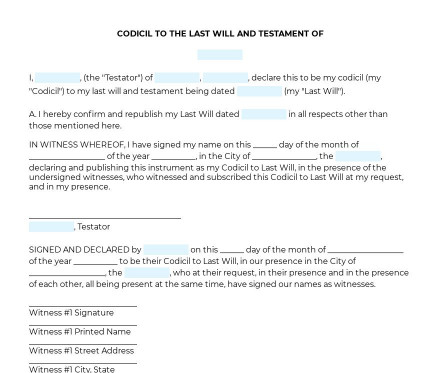Codicil to Last Will and Testament Free
When a person wants to make changes in his Last Will and Testament, he can use this Codicil To Last Will. In the document, the Testator, who created the Will, can make minor changes to it, such as adding, deleting, or changing an existing provision.


 Template Overview
Template Overview
When a person wants to make changes in his Last Will and Testament, he can use this Codicil To Last Will. In the document, the Testator, who created the Will, can make minor changes to it, such as adding, deleting, or changing an existing provision. This document simply amends the Will to make the relevant small changes while leaving the remainder of the Will intact. Note that Codicil is a separate legal document from a Will.
Typical motives why an individual might make a Codicil include:
- The executor of the Will is no longer able or willing to serve in that role;
- Beneficiaries need to be added or removed;
- An existing beneficiary changes their legal name;
- Financial circumstances -- assets and liabilities -- of the Testator have changed
You fill out a form. The document is created before your eyes as you respond to the questions.
At the end, you receive it in Word and PDF formats. You can modify it and reuse it.
 How to use this template
How to use this template
The person filling this document should have access to a copy of the Will that they can refer to as they are creating the Codicil. Note that the exact text of the provision that is being changed has to be included in the Codicil.
The Codicil gives the Testator the following three options for improving their Will:
- Adding a new provision;
- Deleting an existing provision;
- Changing an existing provision;
After this information is filled out, the Testator should number and initial the bottoms of the pages by hand, as well as date it and sign the document in the presence of two witnesses and a notary. The witnesses and a notary have to sign the document as well.
A completed document should be kept in a safe place, along with the original Will.
 Applicable law
Applicable law
State laws govern Wills and Codicils to Last Will. Codicils are interpreted based on the state court where they are probated by a judge when the Testator passes away.
Ready to build your document from this template?


 Please wait
Please wait
